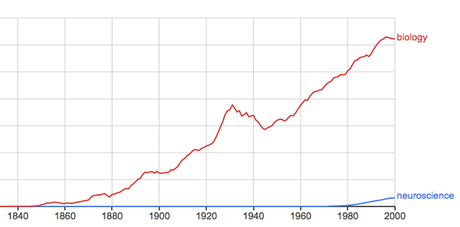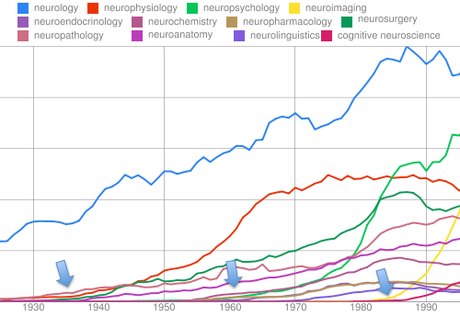Neuroscience is a broad label given to a field that is diverse for many reasons:
- It is a field defined by the fundamental questions it tries to answer, such as “how does the brain work,” as opposed to some fields which are defined by the techniques they use to answer questions (e.g. molecular biology).
- Because it is a relatively new field—compare the appearance below of the word ‘neuroscience’ in books to ‘biology.’—it is studied using techniques from many more established disciplines.
- Because the brain seems to lie right a the node between mind and matter, neuroscience also occupies a special space in science.
- Because it studied from both basic science and medical perspectives.

Because neuroscience is such a new field, many of the older professors I have met and trained with weren’t trained directly in neuroscience themselves, but rather psychology, zoology, molecular biology, genetics, and they have used their knowledge base, skill sets, and techniques to study the brain and nervous system. For example, many molecular biologists (the example I used before of a narrowly-defined discipline) are also neuroscientists if they use molecular biology to study neuroscience. In this way, neuroscience is similar to cancer biology, immunology, and other subfields of biology that focus on particular questions but address them with a variety of techniques. So one could define neuroscience by the techniques used to study it: molecular neuroscience, electrophysiology, engineering, etc.
However, one major difference between neuroscience and other subfields of biology is it’s connection to psychology, philosophy, and ethics. For example experiments conducted by cognitive neuroscientists are often based on traditions rooted far back in psychology.

image from http://egosumdaniel.blogspot.jp/2011/02/some-more-history-of-neuroscience.html
Another way to divide up neuroscience is based on the animal that is studied. Often, it can be hard to generalize the findings of experiments to different species. When I hear laboratories described usually three things are mentioned, the primary question they lab is addressing, the general types of techniques they use, and the species they study. (E.g. a mouse genetics lab studying psychiatric disease, or a songbird auditory electrophysiology lab)
Finally, like many biological fields neuroscience can be studied from both a basic science curiosity-driven perspective—how do things work and why are they like that? What is fascinating about the brain?—and also from clinical perspectives like psychiatry, neurology, neurosurgery, neuroendocrinology, clinical psychology, etc. Each of these fields brings its on history and perspective to neuroscience and can overlap with the fields mentioned before.
That’s how I think about neuroscience, but I’m curious about your perspectives as well. What do you think are the major branches of neuroscience?

